In the days leading up to graduation, Victoria Ejimofor, Class of 2025, took to LinkedIn to shared the lessons she learned while at Darden.
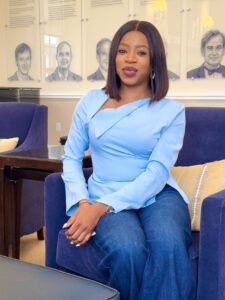 A Batten Entrepreneurship Scholar and Forte Fellow, Ejimofor’s strong leadership and drive grew while completing her MBA these past two years at Darden. Inspired by Amin A.’s Black History Month series in February, where she highlighted Black excellence every single day, Ejimofor “wanted to do something similar to celebrate not just what I’ve learned in the classroom but the lessons that go beyond textbooks. Real-life, eye-opening moments that shape you as a person and a professional.”
A Batten Entrepreneurship Scholar and Forte Fellow, Ejimofor’s strong leadership and drive grew while completing her MBA these past two years at Darden. Inspired by Amin A.’s Black History Month series in February, where she highlighted Black excellence every single day, Ejimofor “wanted to do something similar to celebrate not just what I’ve learned in the classroom but the lessons that go beyond textbooks. Real-life, eye-opening moments that shape you as a person and a professional.”
Here are some highlights of the lessons she shared. To see the full list, check out her LinkedIn.
The Power of Community
It’s not the classes, the case studies or even the exams that make an MBA journey memorable; it’s the community. The people you meet along the way, your fellow students and the professors and staff who become your mentors. They are the ones who truly shape the experience.
So, here’s my first lesson: your MBA journey is only as good as the community that’s backing you up. Don’t underestimate the power of a supportive, collaborative community. Your network isn’t just about LinkedIn connections—it’s about the people you lean on, learn from and grow with.
Decisions, Decisions, Decisions
Decisions don’t make themselves, even if the data says they should. Data doesn’t make the decision for you—it simply informs it. In my Decision Analysis class, we spent a considerable amount of time discussing how to evaluate risk and make decisions based on expected value. This may sound simple in theory, but the real challenge is asking, ‘can we live with the consequences, even if the expected value is positive?’ No decision is ever made in a vacuum, and the process often involves considerable uncertainty.
Don’t stress over making the “right” decision all the time. Make the best decision you can with the information you have, learn from it and keep moving forward. Plus, if it goes south, you’ve got an excellent ‘I learned from it’ story for your next networking event.
Creativity isn’t just a skill; it’s a way of life.
Getting ready for the Barcelona Darden Worldwide Course, I thought we were heading to Spain to explore what creativity meant in a business context. Little did I know, Barcelona taught me creativity isn’t just a skill; it’s a way of life.
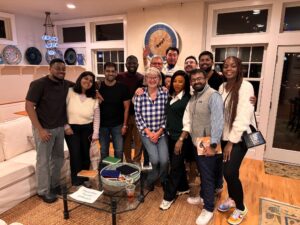 Creativity isn’t confined to an artistic pursuit; it’s an approach to everything. Take Gaudí’s Sagrada Família. Gaudí’s organic architecture inspires me to rethink traditional problem-solving methods. It shows the power of design thinking, where creativity leads the way to better, more innovative solutions.
Creativity isn’t confined to an artistic pursuit; it’s an approach to everything. Take Gaudí’s Sagrada Família. Gaudí’s organic architecture inspires me to rethink traditional problem-solving methods. It shows the power of design thinking, where creativity leads the way to better, more innovative solutions.
Walking through Parc Güell, it’s easy to see how nature influenced Gaudí’s designs. His work doesn’t follow conventional forms; it seamlessly blends art and nature. This sparked my interest in organizational psychology, in creating environments that encourage collaboration and creativity.
Then, of course, there’s Picasso. He took art and turned it into a conversation with himself and the world. From cubism to surrealism, he was never satisfied with simply repeating what had been done before. The lesson? True creativity is uncomfortable. Balancing short-term progress with long-term impact is crucial, and this lesson stuck with me. When you’re building something meaningful, the road is long but the impact is timeless.
Leadership isn’t one size fits all
In the course Reading Seminar in Management, I realized leadership is deeply contextual. The best leaders don’t follow a single prescribed model; they adapt to the situation, the team and the challenges at hand.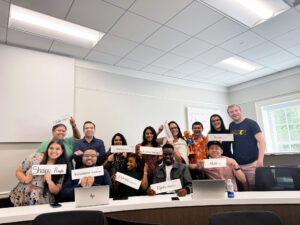
Here are five key lessons I took from the reading:
- You cannot be a great leader without having a great team you can depend on.
- It’s not how well you avoid problems; it’s how well you figure out what the problem is and fix it.
- Just as water retains no constant shape, there is no constant condition in warfare. Leaders must adapt fluidly to the ever-changing circumstances of the environment.
- Great companies have great people. Recognize talent and put the right people in the right seats.
- Execution trumps everything.
DABO 2025 Conference
I had the incredible opportunity to host the DABO 2025 Conference, centered around the theme Africa’s Future: Leveraging Technology As A Catalyst For Growth.
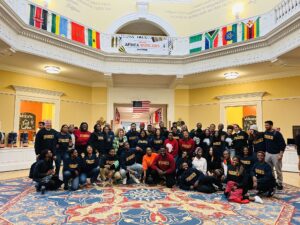 The day was filled with vibrant conversations, insightful perspectives, and practical ideas about how innovation and technology are transforming industries across the continent.
The day was filled with vibrant conversations, insightful perspectives, and practical ideas about how innovation and technology are transforming industries across the continent.
The keynote speaker, Daniel Awe PSM, PSPO, MBA delivered a compelling vision for digital trade transformation, highlighting blockchain-based customs systems, SME financing and smart trade corridors. His message was clear: the future is here if we embrace speed, skill and collaboration.
I still remember one of my first cold calls at Darden.
I spoke, paused, and then immediately thought,
“That didn’t sound smart enough.”
I spent the rest of the class wondering what I could’ve said differently. Meanwhile, others around me seemed to speak so effortlessly, so confidently, like they had all the right answers lined up in their sleep. The hardest parts of business school isn’t the academics, recruiting or even the cold calls. It is the quiet voice of self doubt.
But here’s what I’ve learned: That voice is rarely right. Everyone is figuring it out and growth doesn’t always feel like confidence; it often feels like discomfort. I realized you can’t out-achieve self-doubt, but you can outgrow it.
They say the MBA is all about networking.
Some people even pursue it just for that reason. I came in knowing that and still found myself wondering what it really looks like. How should I approach networking? Spoiler alert: I’m still figuring it out.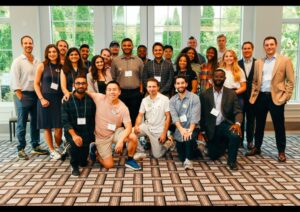
Networking isn’t about working the room or collecting LinkedIn connections, it’s about curiosity, generosity, and shared energy. Lead with interest, not agenda. Be real and be kind.
And whether you’re networking, recruiting, collaborating, or just trying to survive a particularly spicy case discussion, specificity stands out. Know your ask and be clear about it.
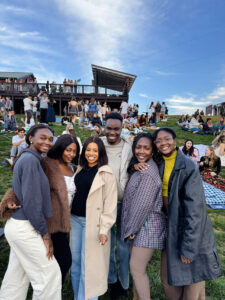 Setting boundaries isn’t a nice-to-have, it’s essential.
Setting boundaries isn’t a nice-to-have, it’s essential.
In an environment where the default mode feels like “do more, say yes, push harder,” learning to set boundaries felt counterintuitive, even uncomfortable. But great relationships don’t come from saying yes to everything — they come from clear, intentional boundaries.
Boundaries aren’t walls. They‘re bridges. They create intentional space for what truly matters and build relationships where people feel safe bringing their authentic selves to work.
Taking the next steps
I walked across the stage in a cap, gown and cords that carry far more than color.
They may look like colorful accessories, but they’re so much more than that.
They carry stories.
Each represents a chapter: leadership, service, scholarship, community, and identity. Wearing them is a reminder that this MBA wasn’t just about academics. It was about impact, representation and growth. Being part of something bigger and leaving something behind for the next person who needs to know they belong here, too. They are a visual reminder that I, and others like me are here. We belong and we lead. Honoring every community I’ve walked with and those who made it possible for me to walk at all.
Gratitude feels too small a word, but I’ll start there.





